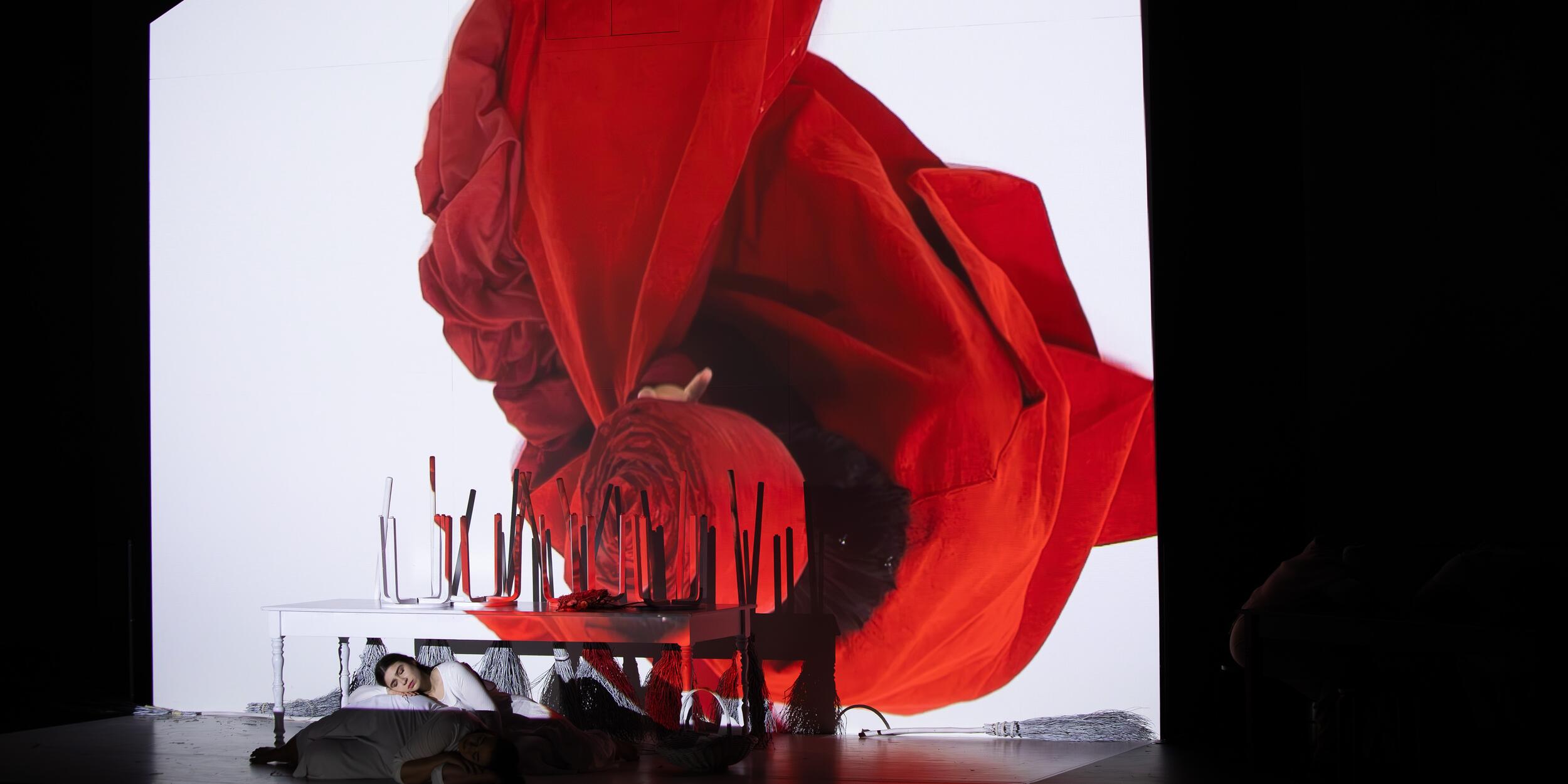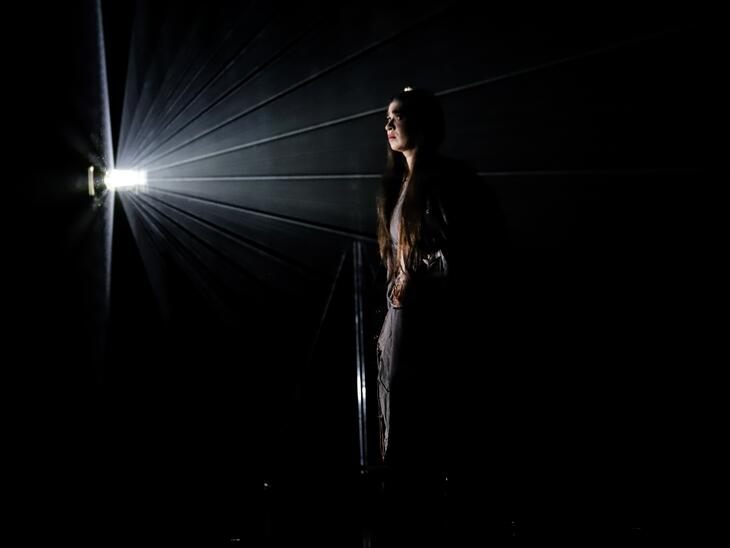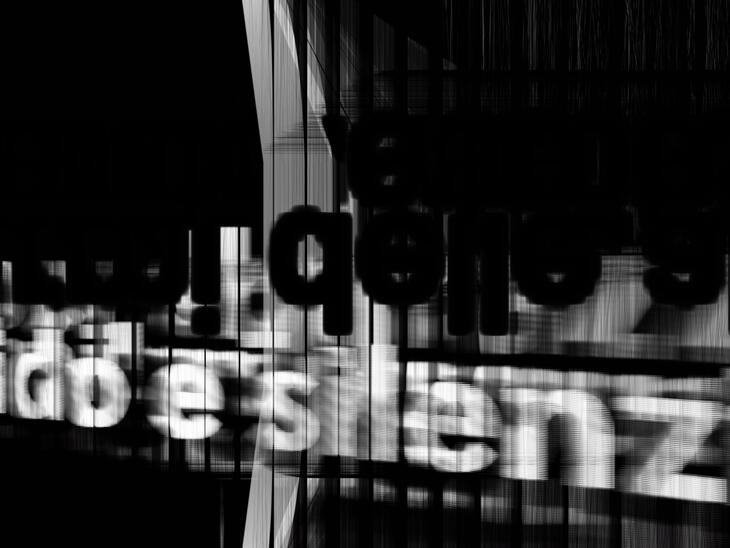Kai Röhrig as musical director and you as director have chosen Engelbert Humperdinck's fairytale play Hansel and Gretel for the current semester. Can you give us an insight into how you and the students work together at the beginning of the semester to find a common reading of the work?
We meet on the first day and tell the students about our concept. I tried to be as specific as possible, because the concept is very different from what you might expect. I asked the students the following: Imagine you are children, it is evening, you are at home, you have eaten dinner, done your homework, brushed your teeth. You are lying in bed, your mother comes in and reads Hansel and Gretel to you. That's our starting point. On stage, we see how Hansel and Gretel work through their fears, how they fight evil in order to go out into the world freely and without the protection of their parents as they grow up, in the sense of a "coming of age" process. Hansel and Gretel work through this process on stage as they live through the story. In my production there is no real gingerbread house, no naturalism or realism: it is set in a world of imagination, a more psychological reading. I think the students were able to understand and accept this approach well, so that they can tell the fairy tale not necessarily as a little boy and a little girl, but as singers and actors. The students trusted us to be able to do this - together with Humperdinck - in this way. In this way, the story is also told to the audience in a "Singspiel" way. In my opinion, this approach is good for us in the sense of: It's not a children's fairy tale, it's not really an opera either. The various imaginations of the children are very well reflected in the musical environment (in the forest, at home, etc.), the various sounds and sound paintings (e.g. cuckoo calls) support the plot. The story itself is told very well through the text and the music.
Do the students have the opportunity to create their roles together with you as director?
Absolutely, they have this opportunity. I give them a certain framework through the above-mentioned concept - I see it as my job to make that possible. But the singers have to find these characters for themselves. This is a process that takes several weeks until the singer finds the emotions of a role and can bring them to the stage. We approached this process in a very theatrical way. It is very complex work to bring singing and acting together without neglecting the performance. In this process, we try to convey to the singers how important it is to search for the truthfulness of a role. We all know feelings such as fear, happiness and boredom: What does the performer look like as Hansel, for example, how does she develop into Hansel with all his emotions in this process? When I see that something has been "pasted on", we work on the emotional dramaturgy. It is important to me that there is such a dramaturgy over longer passages of text. There doesn't always have to be a motif that is created and maintained - such representations seem very contrived. Together, we try to understand and authentically portray the feelings that a person is going through in a certain passage.
The story of Hansel and Gretel is so well-known that there is hardly anyone who doesn't already have their own images of it in their head. What were/are your associations with the basis of the Grimm fairy tale? What images will you try to bring to the stage? Which aspects are particularly important to you and will be worked out intensively?
My view of fairy tales has changed several times. As a child, I found fairy tales exciting and very helpful. Later, I found them very cruel and now I see fairy tales as an indication of our socialization. They give us a view of the world, even though as a child we have no understanding of such questions and no awareness of how to explain such stories. In principle, I don't actually find fairy tales on stage very interesting. But Humperdinck is a different story. The decision to perform this opera was made deliberately and for our class. The choice of this fairytale opera is a clear invitation to the students to tell the story psychologically - and I'm really excited! There are so many ways to present this as a serious stage play. The imagination of a child and the associative potential of theater are eerily similar. Both are inexhaustible, both are mysterious and free. And the innocence and cruelty of the world lie dormant in both. I want to show how difficult it is to be a child. What you have to struggle with as a child and ultimately always fight alone. This aspect is very important to me. I always start working on an opera with the music. I come from a choreography and dance background, so I always try to tell the singers how important it is to pay attention to body language and body signals. Words are not always the true narrators. This aspect is also essential for the audience, because the performance must be truthful and the emotion must match the situation. Once this attitude has been internalized, I can use the musical level and the choreography to work out with the students what I want and what I actually want to bring to the opera stage.
How do you deal with the stereotypical role of the Crunchy Witch, who embodies "evil" in the usual fairytale way? In your production, the Crunchy Witch is cast with two different voice parts (mezzo-soprano and tenor). To what extent does this change the role?
We are lucky to have two great singers: A woman and a man. It's very interesting working with the two of them. It's quite common to see the witch as the mother. But I find it very interesting for which voices it is composed (e.g. Hansel and Gretel for two sopranos, Witch for soprano or tenor). I thought about the gender question and wanted to defuse the issue a little by neither forcing the trouser role nor specifying the genders. On a psychological level, these characters can all look more or less the same, be dressed in the same costume, it doesn't matter. But I wanted to describe the evil itself very precisely. We're talking about cannibalism, child abuse, very heavy subjects. That's my description of "evil", there's nothing worse than seeing children being abused.
What is the role of Claudia Lehmann's students in your directing concept?
We asked the six students from the Department of Scenography to interpret the instrumental passages for us using video recordings. They bring a completely new aspect and new approaches to the production, working very differently, very creatively and in their very own way with their own means. The work is not yet finished (it is incredibly time-consuming to produce a four-minute film!). It will be a great contrast to what is happening on stage and will open up an associative and surprising world from the students' point of view. I love it when theater can surprise!




